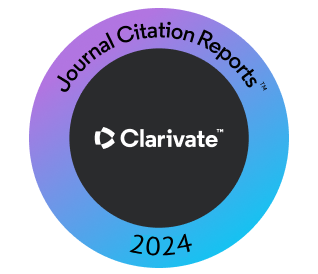Analyzing Colorectal Cancer at the Molecular Level through Next-generation Sequencing in Erbil City
Abstract
Colorectal cancer (CRC) ranks as the third leading cause of cancer-related deaths globally. It is characterized as a genomic disorder marked by diverse genomic anomalies, including point mutations, genomic rearrangements, gene fusions, and alterations in chromosomal copy numbers. This research aims to identify previously undisclosed genetic variants associated with an increased risk of CRC by employing next-generation sequencing technology. Genomic DNA was extracted from blood specimens of five CRC patients. The sequencing data of the samples are utilized for variant identification. In addition, the Integrative Genomic Viewer software (IGV) is used to visualize the identified variants. Furthermore, various in silico tools, including Mutation Taster and Align GVGD, are used to predict the potential impact of mutations on structural features and protein function. Based on the findings of this research, 12 different genetic variations are detected among individuals with CRC. Inherited variations are located within the following genes: MSH6, MSH2, PTPRJ, PMS2, TP53, BRAF, APC, and PIK3CA.
Downloads
References
Abid, M.N., Qadir, F.A., and Salihi, A., 2021. Association between the serum concentrations and mutational status of IL8, IL27 and VEGF and the expression levels of the hERG potassium channel gene in patients with colorectal cancer. Oncology Letters, 22, p.665. DOI: https://doi.org/10.3892/ol.2021.12926
Aghabozorgi, A.S., Bahreyni, A., Soleimani, A., Bahrami, A., Khazaei, M., Ferns, G.A., Avan, A., and Hassanian, S.M., 2019. Role of adenomatous polyposis coli (APC) gene mutations in the pathogenesis of colorectal cancer; current status and perspectives. Biochimie, 157, pp.64-71. DOI: https://doi.org/10.1016/j.biochi.2018.11.003
Ali Hama, H., 2019. Evaluation of p53 expression among colorectal cancer patients. Zanco Journal of Pure and Applied Sciences, 31, pp.131-134. DOI: https://doi.org/10.21271/ZJPAS.31.6.14
Arbyn, M., Weiderpass, E., Bruni, L., De Sanjose, S., Saraiya, M., Ferlay, J., and Bray, F., 2020. Estimates of incidence and mortality of cervical cancer in 2018: A worldwide analysis. The Lancet Global Health, 8, pp.e191-e203. DOI: https://doi.org/10.1016/S2214-109X(19)30482-6
Baglietto, L., Lindor, N.M., Dowty, J.G., White, D.M., Wagner, A., Gomez Garcia, E.B., Vriends, A. H., Dutch Lynch Syndrome Study Group, Cartwright, N.R., and Barnetson, R.A., 2010. Risks of lynch syndrome cancers for MSH6 mutation carriers. Journal of the National Cancer Institute, 102, pp.193-201. DOI: https://doi.org/10.1093/jnci/djp473
Bardhan, K., and Liu, K., 2013. Epigenetics and colorectal cancer pathogenesis. Cancers (Basel), 5, p.676-713. DOI: https://doi.org/10.3390/cancers5020676
Barrasa, J.I., Olmo, N., Lizarbe, M.A., and Turnay, J., 2013. Bile acids in the colon, from healthy to cytotoxic molecules. Toxicology in Vitro, 27, pp.964-977. DOI: https://doi.org/10.1016/j.tiv.2012.12.020
Berends, M.J.W., Wu, Y., Sijmons, R.H., Mensink, R.G.J., Van Der Sluis, T., Hordijk-Hos, J.M., De vries, E.G., Hollema, H., Karrenbeld, A., and Buys, C.H.C.M., 2002. Molecular and clinical characteristics of MSH6 variants: An analysis of 25 index carriers of a germline variant. The American Journal of Human Genetics, 70, pp.26-37. DOI: https://doi.org/10.1086/337944
Boland, C.R., and Goel, A., 2010. Microsatellite instability in colorectal cancer. Gastroenterology, 138, pp.2073-2087.e3. DOI: https://doi.org/10.1053/j.gastro.2009.12.064
Caputo, F., SantinI, C., Bardasi, C., Cerma, K., Casadei-Gardini, A., Spallanzani, A., Andrikou, K., Cascinu, S., and Gelsomino, F., 2019. BRAF-mutated colorectal cancer: Clinical and molecular insights. International Journal of Molecular Sciences, 20, p.5369. DOI: https://doi.org/10.3390/ijms20215369
Carneiro Da Silva, F., Ferreira, J.R.D.O., Torrezan, G.T., Figueiredo, M.C.P., Santos, É.M.M., Nakagawa, W.T., Brianese, R.C., Petrolini de oliveira, L., Begnani, M.D., and Aguiar-Junior, S., 2015. Clinical and molecular characterization of Brazilian patients suspected to have Lynch syndrome. PLoS One, 10, p.e0139753. DOI: https://doi.org/10.1371/journal.pone.0139753
Cathomas, G., 2014. PIK3CA in colorectal cancer. Frontiers in Oncology, 4, p.35. DOI: https://doi.org/10.3389/fonc.2014.00035
Cossio, S.L., Koehler-Santos, P., Pessini, S.A., Mónego, H., Edelweiss, M.I., Meurer, L., Errami, A., Coffa, J., Bock, H., and Saraiva-Pereira, M.L., 2010. Clinical and histomolecular endometrial tumor characterization of patients at-risk for Lynch syndrome in South of Brazil. Familial Cancer, 9, pp.131-139. DOI: https://doi.org/10.1007/s10689-009-9297-x
Da Silva, F.C., De Oliveira, L.P., Santos, E.M., Nakagawa, W.T., Aguiar Junior, S., Valentin, M.D., Rossi, B.M., and De Oliveira Ferreira, F., 2010. Frequency of extracolonic tumors in Brazilian families with Lynch syndrome: Analysis of a hereditary colorectal cancer institutional registry. Familial Cancer, 9, pp.563-570. DOI: https://doi.org/10.1007/s10689-010-9373-2
Davies, H., Bignell, G.R., Cox, C., Stephens, P., Edkins, S., Clegg, S., Teague, J., Woffendin, H., Garnett, M.J., and Bottomley, W., 2002. Mutations of the BRAF gene in human cancer. Nature, 417, pp.949-954. DOI: https://doi.org/10.1038/nature00766
Dominguez-Valentin, M., Nilbert, M., Wernhoff, P., López-Köstner, F., Vaccaro, C., Sarroca, C., Palmero, E.I., Giraldo, A., Ashton-Prolla, P., and Alvarez, K., 2013. Mutation spectrum in South American Lynch syndrome families, Hereditary Cancer in Clinical Practice, 11, p.18. DOI: https://doi.org/10.1186/1897-4287-11-18
Dominguez-Valentin, M., Sampson, J.R., Seppälä, T.T., Ten Broeke, S.W., Plazzer, J.P., Nakken, S., Engel, C., Aretz, S., Jenkins, M.A., and Sunde, L., 2020. Cancer risks by gene, age, and gender in 6350 carriers of pathogenic mismatch repair variants: Findings from the prospective lynch syndrome database. Genetics in Medicine, 22, pp.15-25.
Fatemi, N., Tu, S.J., Chung, C.C., Moghadam, P.K., Mojarad, E.N., Sadeghi, A., Totonchi, M., Aghdaei, H.A., and Chang, J.G., 2023. Whole exome sequencing identifies MAP3K1, MSH2, and MLH1 as potential cancer-predisposing genes in familial early-onset colorectal cancer. The Kaohsiung Journal of Medical Sciences, 39, pp.896-903. DOI: https://doi.org/10.1002/kjm2.12715
Frederiksen, J.H., Jensen, S.B., Tumer, Z., and Hansen, T.V.O., 2021. Classification of MSH6 variants of uncertain significance using functional assays. International Journal of Molecular Sciences, 22, p.8627. DOI: https://doi.org/10.3390/ijms22168627
Fuchs, C.S., Giovannucci, E.L., Colditz, G.A., Hunter, D.J., Speizer, F.E., and Willett, W.C., 1994. A prospective study of family history and the risk of colorectal cancer. New England Journal of Medicine, 331, pp.1669-1674. DOI: https://doi.org/10.1056/NEJM199412223312501
Giannopoulou, N., and Constantinou, C., 2023. Recent developments in diagnostic and prognostic biomarkers for colorectal cancer: A narrative review. Oncology, 101, pp.675-684. DOI: https://doi.org/10.1159/000531474
Hause, R.J., Pritchard, C.C., Shendure, J., and Salipante, S.J., 2016. Classification and characterization of microsatellite instability across 18 cancer types. Nature Medicine, 22, pp.1342-1350. DOI: https://doi.org/10.1038/nm.4191
He, X., Li, Y., Deng, B., Lin, A., Zhang, G., Ma, M., Wang, Y., Yang, Y., and Kang, X., 2022. The PI3K/AKT signalling pathway in inflammation, cell death and glial scar formation after traumatic spinal cord injury: Mechanisms and therapeutic opportunities. Cell Proliferation, 55, p.e13275. DOI: https://doi.org/10.1111/cpr.13275
Hendriks, Y.M., Wagner, A., Morreau, H., Menko, F., Stormorken, A., Quehenberger, F., Sandkuijl, L., Møller, P., Genuardi, M., and Van Houwelingen, H., 2004. Cancer risk in hereditary nonpolyposis colorectal cancer due to MSH6 mutations: Impact on counseling and surveillance. Gastroenterology, 127, pp.17-25. DOI: https://doi.org/10.1053/j.gastro.2004.03.068
Janku, F., Wheler, J.J., Westin, S.N., Moulder, S.L., Naing, A., Tsimberidou, A.M., Fu, S., Falchook, G.S., Hong, D.S., and Garrido-Laguna, I., 2012. PI3K/AKT/mTOR inhibitors in patients with breast and gynecologic malignancies harboring PIK3CA mutations. Journal of Clinical Oncology, 30, p.777. DOI: https://doi.org/10.1200/JCO.2011.36.1196
Kamal, L.A., and Jalal, J.A., 2019. Immunohistochemical expression of HER2/neu in colorectal carcinoma in Erbil city, Kurdistan region. Zanco Journal of Medical Sciences (Zanco J Med Sci), 23, pp.421-428. DOI: https://doi.org/10.15218/zjms.2019.052
Keum, N., and Giovannucci, E., 2019. Global burden of colorectal cancer: Emerging trends, risk factors and prevention strategies. Nature Reviews Gastroenterology and Hepatology, 16, pp.713-732. DOI: https://doi.org/10.1038/s41575-019-0189-8
Kontomanolis, E.N., Koutras, A., Syllaios, A., Schizas, D., Mastoraki, A., Garmpis, N., Diakosavvas, M., Angelou, K., Tsatsaris, G., and Pagkalos, A., 2020. Role of oncogenes and tumor-suppressor genes in carcinogenesis: Areview. Anticancer Research, 40, pp.6009-6015. DOI: https://doi.org/10.21873/anticanres.14622
Laczmanska, I., and Sasiadek, M.M., 2019. Meta-analysis of association between Arg326Gln (rs1503185) and Gln276Pro (rs1566734) polymorphisms of PTPRJ gene and cancer risk. Journal of Applied Genetics, 60, p.57-62. DOI: https://doi.org/10.1007/s13353-019-00481-3
Li, H., Zhang, P., Liu, C., Wang, Y., Deng, Y., Dong, W., and Yu, Y., 2022. The structure, function and regulation of protein tyrosine phosphatase receptor type J and its role in diseases. Cells, 12, p.8. DOI: https://doi.org/10.3390/cells12010008
Lynch, H.T., and De La Chapelle, A., 1999. Genetic susceptibility to non-polyposis colorectal cancer. Journal of Medical Genetics, 36, pp.801-818.
Lynch, H.T., and Lynch, J.F., 1985. Hereditary nonpolyposis colorectal cancer (Lynch syndromes I and II): Acommon genotype linked to oncogenes? Medical Hypotheses, 18, pp.19-28. DOI: https://doi.org/10.1016/0306-9877(85)90115-X
Malińska, K., Deptuła, J., Rogoża-Janiszewska, E., Górski, B., Scott, R., Rudnicka, H., Kashyap, A., Domagała, P., Hybiak, J., and Masojć, B., 2020.
Constitutional variants in POT1, TERF2IP, and ACD genes in patients with melanoma in the Polish population. European Journal of Cancer Prevention, 29, pp.511-519. DOI: https://doi.org/10.1097/CEJ.0000000000000633
Mathe, E., Olivier, M., Kato, S., Ishioka, C., Hainaut, P., and Tavtigian, S.V., 2006. Computational approaches for predicting the biological effect of p53 missense mutations: A comparison of three sequence analysis based methods. Nucleic Acids Research, 34, pp.1317-1325. DOI: https://doi.org/10.1093/nar/gkj518
Mita, Y., Yasuda, Y., Sakai, A., Yamamoto, H., Toyooka, S., Gunduz, M., Tanabe, S., Naomoto, Y., Ouchida, M., and Shimizu, K., 2010. Missense polymorphisms of PTPRJ and PTPN13 genes affect susceptibility to a variety of human cancers. Journal of Cancer Research and Clinical Oncology, 136, pp.249-259. DOI: https://doi.org/10.1007/s00432-009-0656-7
Morgan, D., Berggren, K.L., Spiess, C.D., Smith, H.M., Tejwani, A., Weir, S.J., Lominska, C.E., Thomas, S.M., and Gan, G.N., 2022. Mitogen-activated protein kinase-activated protein kinase-2 (MK2) and its role in cell survival, inflammatory signaling, and migration in promoting cancer. Molecular Carcinogenesis, 61, pp.173-199. DOI: https://doi.org/10.1002/mc.23348
Murphy, N., Moreno, V., Hughes, D.J., Vodicka, L., Vodicka, P., Aglago, E.K., Gunter, M.J., and Jenab, M., 2019. Lifestyle and dietary environmental factors in colorectal cancer susceptibility. Molecular Aspects of Medicine, 69, pp.2-9. DOI: https://doi.org/10.1016/j.mam.2019.06.005
Nguyen, H.T., and Duong, H.Q., 2018. The molecular characteristics of colorectal cancer: Implications for diagnosis and therapy. Oncology Letters, 16, pp.9-18. DOI: https://doi.org/10.3892/ol.2018.8679
Olivier, M., Hollstein, M., and Hainaut, P., 2010. TP53 mutations in human cancers: Origins, consequences, and clinical use. Cold Spring Harbor Perspectives in Biology, 2, p.a001008. DOI: https://doi.org/10.1101/cshperspect.a001008
Peltokallio, P., and Peltokallio, V., 1966. Relationship of familial factors to carcinoma of the colon. Diseases of the Colon and Rectum, 9, pp.367-370. DOI: https://doi.org/10.1007/BF02617105
Perne, C., Peters, S., Cartolano, M., Horpaopan, S., Grimm, C., Altmuller, J., Sommer, A.K., Hillmer, A.M., Thiele, H., and Odenthal, M., 2021. Variant profiling of colorectal adenomas from three patients of two families with MSH3-related adenomatous polyposis. PLos One, 16, p.e0259185. DOI: https://doi.org/10.1371/journal.pone.0259185
Poaty, H., Bouya, L.B., Lumaka, A., Mongo-Onkouo, A., and Gassaye, D., 2023. PMS2 Pathogenic variant in lynch syndrome-associated colorectal cancer with polyps. Global Medical Genetics, 10, pp.1-5. DOI: https://doi.org/10.1055/s-0042-1759888
Rakesh, R., Priyadharshini, L.C., Sakthivel, K.M., and Rasmi, R.R., 2022. Role and regulation of autophagy in cancer. Biochimica et Biophysica Acta (BBA)-Molecular Basis of Disease, 1868, p.166400. DOI: https://doi.org/10.1016/j.bbadis.2022.166400
Rao, C.V., and Yamada, H.Y., 2013. Genomic instability and colon carcinogenesis: From the perspective of genes. Frontiers in Oncology, 3, p.130. DOI: https://doi.org/10.3389/fonc.2013.00130
Raza, Y., Ahmed, A., Khan, A., Chishti, A.A., Akhter, S.S., Mubarak, M., Bernstein, C., Zaitlin, B., and Kazmi, S.U., 2020. Helicobacter pylori severely reduces expression of DNA repair proteins PMS2 and ERCC1 in gastritis and gastric cancer. DNA Repair (Amst), 89, p.102836. DOI: https://doi.org/10.1016/j.dnarep.2020.102836
Roberts, M.E., Jackson, S.A., Susswein, L.R., Zeinomar, N., Ma, X., Marshall, M.L., Stettner, A.R., Milewski, B., Xu, Z., and Solomon, B.D., 2018.
MSH6 and PMS2 germ-line pathogenic variants implicated in Lynch syndrome are associated with breast cancer. Genetics in Medicine, 20, p.1167-1174. DOI: https://doi.org/10.1038/gim.2017.254
Sanz-Pamplona, R., Lopez-Doriga, A., Pare-Brunet, L., Lázaro, K., Bellido, F., Alonso, M.H., Aussó, S., Guinó, E., Beltrán, S., and Castro-Giner, F., 2015.
Exome sequencing reveals AMER1 as a frequently mutated gene in colorectal cancer. Clinical Cancer Research, 21, pp.4709-4718. DOI: https://doi.org/10.1158/1078-0432.CCR-15-0159
Schwarz, J.M., Cooper, D.N., Schuelke, M., and Seelow, D., 2014. MutationTaster2: Mutation prediction for the deep-sequencing age. Nature Methods, 11, pp.361-362. DOI: https://doi.org/10.1038/nmeth.2890
Segditsas, S., and Tomlinson, I., 2006. Colorectal cancer and genetic alterations in the Wnt pathway. Oncogene, 25, pp.7531-7537. DOI: https://doi.org/10.1038/sj.onc.1210059
Senter, L., Clendenning, M., Sotamaa, K., Hampel, H., Green, J., Potter, J.D., Lindblom, A., Lagerstedt, K., Thibodeau, S.N., and Lindor, N.M., 2008. The clinical phenotype of Lynch syndrome due to germ-line PMS2 mutations. Gastroenterology, 135, pp.419-428. DOI: https://doi.org/10.1053/j.gastro.2008.04.026
Sinicrope, F.A., 2018. Lynch syndrome-associated colorectal cancer. New England Journal of Medicine, 379, pp.764-773. DOI: https://doi.org/10.1056/NEJMcp1714533
Stefanski, C.D., and Prosperi, J.R., 2020. Wnt-independent and Wnt-dependent effects of APC loss on the chemotherapeutic response. International Journal of Molecular Sciences, 21, p.7844. DOI: https://doi.org/10.3390/ijms21217844
Tariq, K., and Ghias, K., 2016. Colorectal cancer carcinogenesis: A review of mechanisms. Cancer Biology and Medicine, 13, p120. DOI: https://doi.org/10.20892/j.issn.2095-3941.2015.0103
Tavtigian, S.V., Deffenbaugh, A.M., Yin, L., Judkins, T., Scholl, T., Samollow, P.B., De Silva, D., Zharkikh, A., and Thomas, A., 2006.
Comprehensive statistical study of 452 BRCA1 missense substitutions with classification of eight recurrent substitutions as neutral. Journal of Medical Genetics, 43, p.295-305. DOI: https://doi.org/10.1136/jmg.2005.033878
Ten Broeke, S.W., Brohet, R.M., Tops, C.M., Van der Klift, H.M., Velthuizen, M.E., Bernstein, I., Capellá Munar, G., Gomez Garcia, E., Hoogerbrugge, N., and Letteboer, T., 2015. Lynch syndrome caused by germline PMS2 mutations: Delineating the cancer risk. Journal of Clinical Oncology, 33, p.319-325. DOI: https://doi.org/10.1200/JCO.2014.57.8088
Vaser, R., Adusumalli, S., Leng, S.N., Sikic, M., and NG, P.C., 2016. SIFT missense predictions for genomes. Nature Protocols, 11, p.1-9. DOI: https://doi.org/10.1038/nprot.2015.123
Winawer, S., Fletcher, R., Rex, D., Bond, J., Burt, R., Ferrucci, J., Ganiats, T., Levin, T., Woolf, S., and Johnson, D., 2003. Colorectal cancer screening and surveillance: Clinical guidelines and rationale-update based on new evidence. Gastroenterology, 124, p.544-560. DOI: https://doi.org/10.1053/gast.2003.50044
Youssef, A., Abdel-Fattah, M.A., Touny, A.O., Hassan, Z.K., Nassar, A., Lotfy, M.M., Moustafa, A., Eldin, M.M., Bahnassy, A., and Zekri, A.R.N., 2020. Deep Next Generation Sequencing Identifies Somatic Mutational Signature in Egyptian Colorectal Cancer Patients. DOI: https://doi.org/10.21203/rs.3.rs-125305/v1
Zhang, X., Li, C., Wu, Y., and Cui, P., 2023. The research progress of Wnt/β-catenin signaling pathway in colorectal cancer. Clinics and Research in Hepatology and Gastroenterology, 47, p.102086. DOI: https://doi.org/10.1016/j.clinre.2023.102086
Zhao, Y., Zhao, X., Chen, V., Feng, Y., Wang, L., Croniger, C., Conlon, R.A., Markowitz, S., Fearon, E., and Puchowicz, M., 2019. Colorectal cancers utilize glutamine as an anaplerotic substrate of the TCA cycle in vivo. Scientific Reports, 9, p.19180. DOI: https://doi.org/10.1038/s41598-019-55718-2
Copyright (c) 2024 Vyan A. Qadir, Kamaran K. Abdoulrahman

This work is licensed under a Creative Commons Attribution-NonCommercial-ShareAlike 4.0 International License.
Authors who choose to publish their work with Aro agree to the following terms:
-
Authors retain the copyright to their work and grant the journal the right of first publication. The work is simultaneously licensed under a Creative Commons Attribution License [CC BY-NC-SA 4.0]. This license allows others to share the work with an acknowledgement of the work's authorship and initial publication in this journal.
-
Authors have the freedom to enter into separate agreements for the non-exclusive distribution of the journal's published version of the work. This includes options such as posting it to an institutional repository or publishing it in a book, as long as proper acknowledgement is given to its initial publication in this journal.
-
Authors are encouraged to share and post their work online, including in institutional repositories or on their personal websites, both prior to and during the submission process. This practice can lead to productive exchanges and increase the visibility and citation of the published work.
By agreeing to these terms, authors acknowledge the importance of open access and the benefits it brings to the scholarly community.















 ARO Journal is a scientific, peer-reviewed, periodical, and diamond OAJ that has no APC or ASC.
ARO Journal is a scientific, peer-reviewed, periodical, and diamond OAJ that has no APC or ASC.